An In-depth Analysis of Ethics and Corporate Social Responsibility
VerifiedAdded on 2022/09/17
|5
|1245
|26
Essay
AI Summary
This essay examines the concept of Corporate Social Responsibility (CSR), analyzing its evolution beyond mere profit-making to encompass ethical responsibilities towards society and stakeholders. It explores various authors' perspectives on CSR, contrasting it with profit-driven activities and government initiatives. The essay highlights the significance of CSR in business ethics, emphasizing the stakeholder theory and the importance of building relationships with key stakeholders. It discusses the motivations behind firms' investments in CSR, including gaining publicity, managing risk, and enhancing brand image. The essay also addresses the benefits of CSR, such as increased sales, improved brand image, and employee retention, while acknowledging potential negative impacts like challenges to profit maximization. It concludes that CSR is crucial for future competitive success, advocating for companies to prioritize ethical and responsible practices for societal development and welfare. The essay references key academic sources, including DiMaggio and Powell, Matten and Moon, Freeman, Mitchell et al., and Suchman, to support its arguments and analysis.
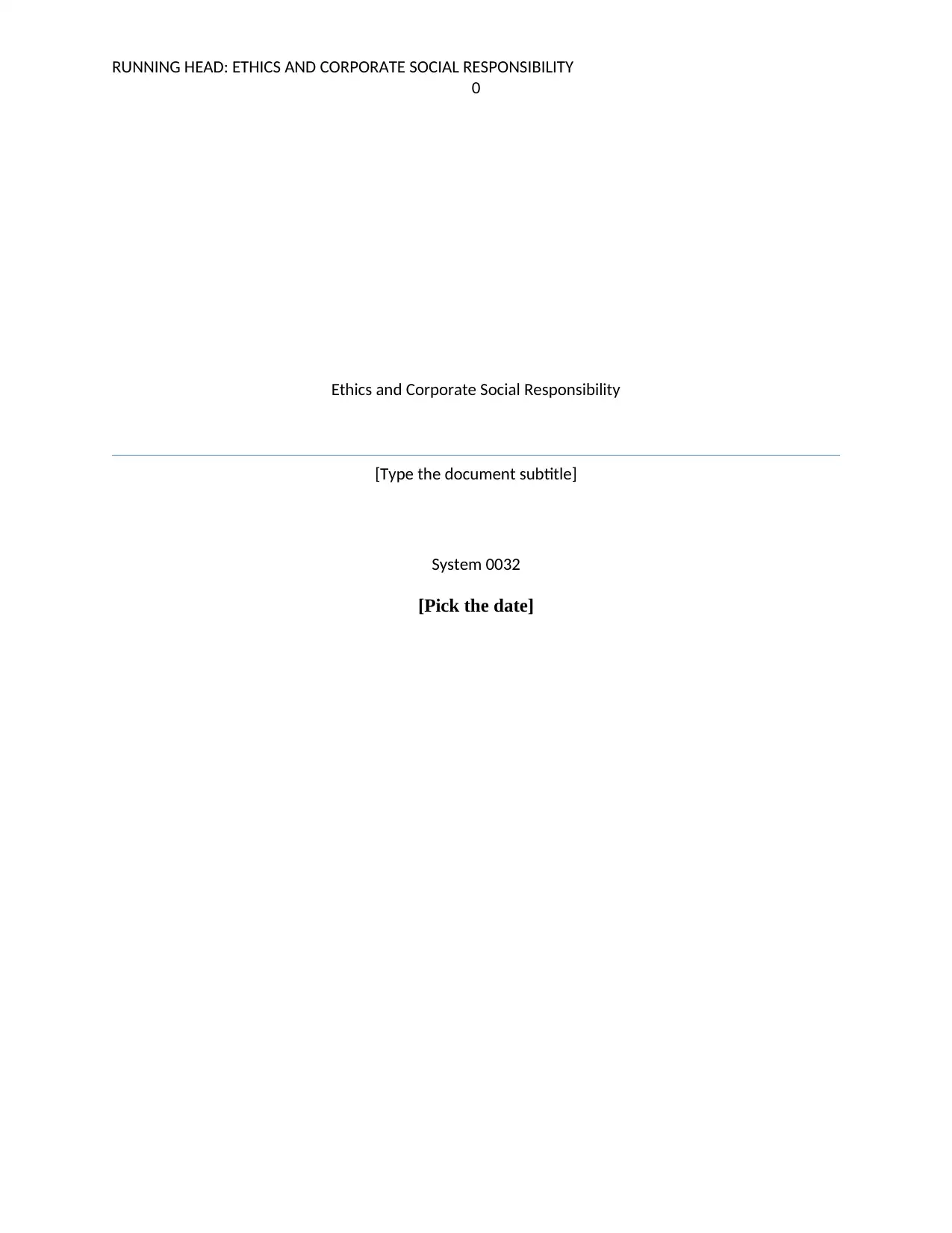
RUNNING HEAD: ETHICS AND CORPORATE SOCIAL RESPONSIBILITY
0
Ethics and Corporate Social Responsibility
[Type the document subtitle]
System 0032
[Pick the date]
0
Ethics and Corporate Social Responsibility
[Type the document subtitle]
System 0032
[Pick the date]
Paraphrase This Document
Need a fresh take? Get an instant paraphrase of this document with our AI Paraphraser
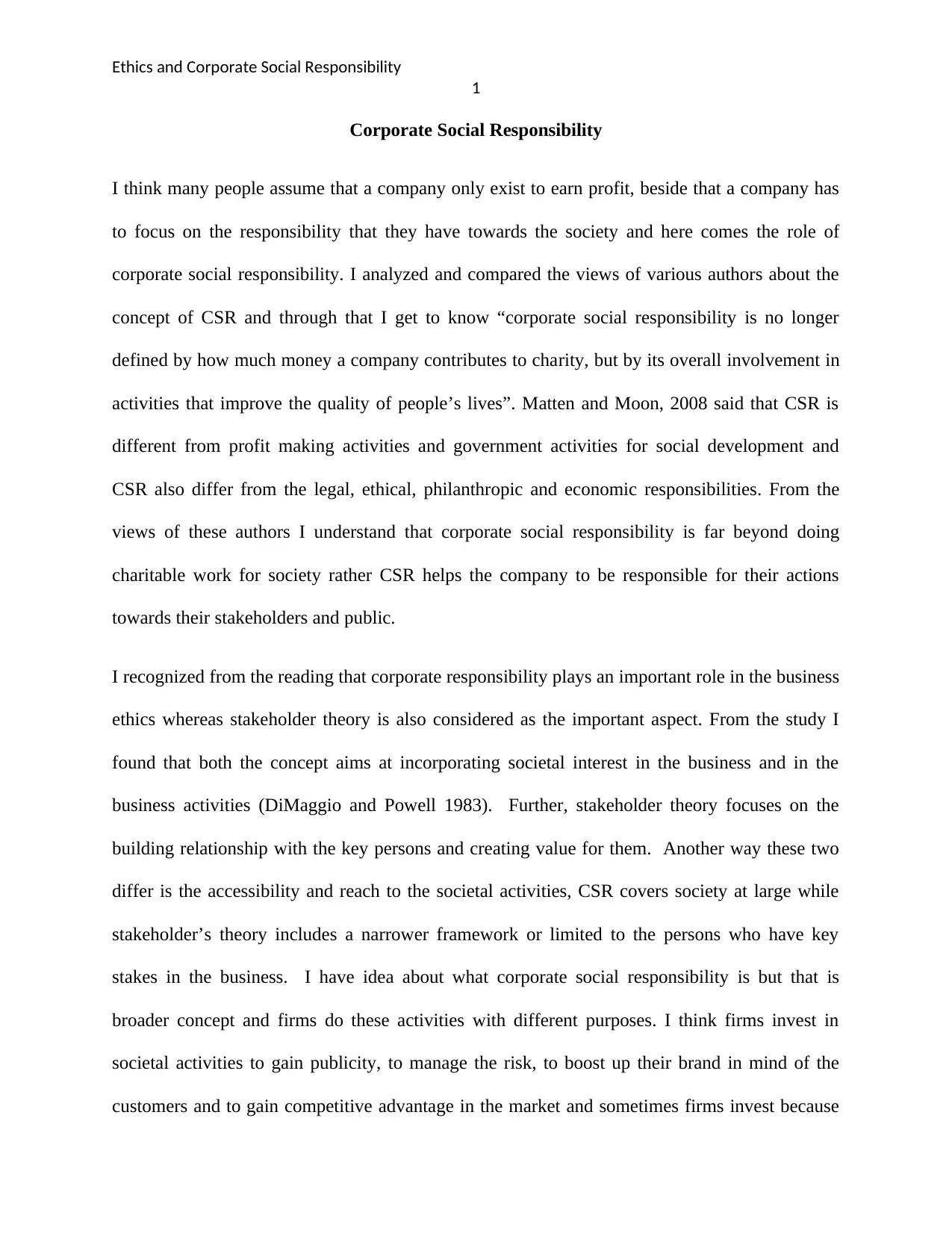
Ethics and Corporate Social Responsibility
1
Corporate Social Responsibility
I think many people assume that a company only exist to earn profit, beside that a company has
to focus on the responsibility that they have towards the society and here comes the role of
corporate social responsibility. I analyzed and compared the views of various authors about the
concept of CSR and through that I get to know “corporate social responsibility is no longer
defined by how much money a company contributes to charity, but by its overall involvement in
activities that improve the quality of people’s lives”. Matten and Moon, 2008 said that CSR is
different from profit making activities and government activities for social development and
CSR also differ from the legal, ethical, philanthropic and economic responsibilities. From the
views of these authors I understand that corporate social responsibility is far beyond doing
charitable work for society rather CSR helps the company to be responsible for their actions
towards their stakeholders and public.
I recognized from the reading that corporate responsibility plays an important role in the business
ethics whereas stakeholder theory is also considered as the important aspect. From the study I
found that both the concept aims at incorporating societal interest in the business and in the
business activities (DiMaggio and Powell 1983). Further, stakeholder theory focuses on the
building relationship with the key persons and creating value for them. Another way these two
differ is the accessibility and reach to the societal activities, CSR covers society at large while
stakeholder’s theory includes a narrower framework or limited to the persons who have key
stakes in the business. I have idea about what corporate social responsibility is but that is
broader concept and firms do these activities with different purposes. I think firms invest in
societal activities to gain publicity, to manage the risk, to boost up their brand in mind of the
customers and to gain competitive advantage in the market and sometimes firms invest because
1
Corporate Social Responsibility
I think many people assume that a company only exist to earn profit, beside that a company has
to focus on the responsibility that they have towards the society and here comes the role of
corporate social responsibility. I analyzed and compared the views of various authors about the
concept of CSR and through that I get to know “corporate social responsibility is no longer
defined by how much money a company contributes to charity, but by its overall involvement in
activities that improve the quality of people’s lives”. Matten and Moon, 2008 said that CSR is
different from profit making activities and government activities for social development and
CSR also differ from the legal, ethical, philanthropic and economic responsibilities. From the
views of these authors I understand that corporate social responsibility is far beyond doing
charitable work for society rather CSR helps the company to be responsible for their actions
towards their stakeholders and public.
I recognized from the reading that corporate responsibility plays an important role in the business
ethics whereas stakeholder theory is also considered as the important aspect. From the study I
found that both the concept aims at incorporating societal interest in the business and in the
business activities (DiMaggio and Powell 1983). Further, stakeholder theory focuses on the
building relationship with the key persons and creating value for them. Another way these two
differ is the accessibility and reach to the societal activities, CSR covers society at large while
stakeholder’s theory includes a narrower framework or limited to the persons who have key
stakes in the business. I have idea about what corporate social responsibility is but that is
broader concept and firms do these activities with different purposes. I think firms invest in
societal activities to gain publicity, to manage the risk, to boost up their brand in mind of the
customers and to gain competitive advantage in the market and sometimes firms invest because
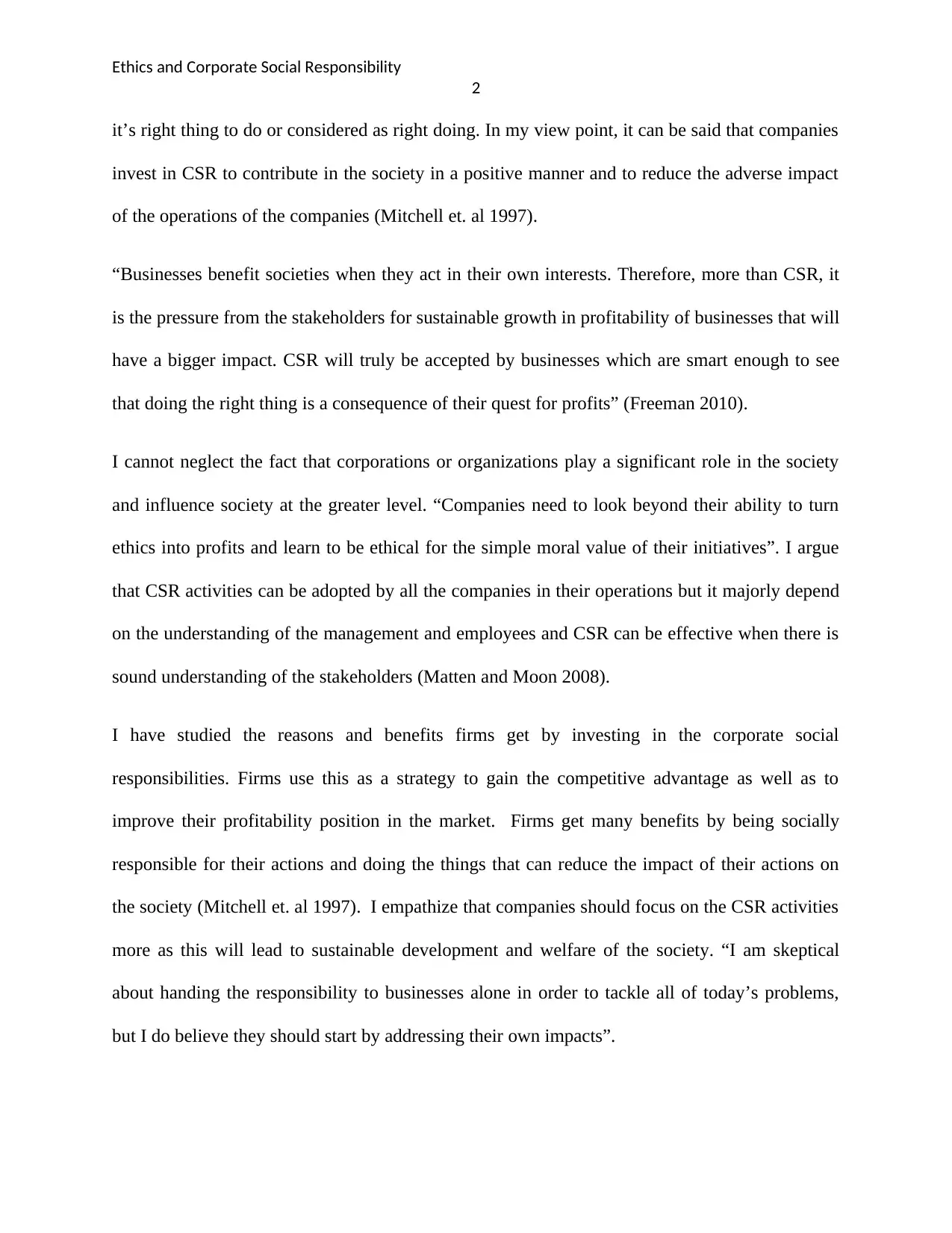
Ethics and Corporate Social Responsibility
2
it’s right thing to do or considered as right doing. In my view point, it can be said that companies
invest in CSR to contribute in the society in a positive manner and to reduce the adverse impact
of the operations of the companies (Mitchell et. al 1997).
“Businesses benefit societies when they act in their own interests. Therefore, more than CSR, it
is the pressure from the stakeholders for sustainable growth in profitability of businesses that will
have a bigger impact. CSR will truly be accepted by businesses which are smart enough to see
that doing the right thing is a consequence of their quest for profits” (Freeman 2010).
I cannot neglect the fact that corporations or organizations play a significant role in the society
and influence society at the greater level. “Companies need to look beyond their ability to turn
ethics into profits and learn to be ethical for the simple moral value of their initiatives”. I argue
that CSR activities can be adopted by all the companies in their operations but it majorly depend
on the understanding of the management and employees and CSR can be effective when there is
sound understanding of the stakeholders (Matten and Moon 2008).
I have studied the reasons and benefits firms get by investing in the corporate social
responsibilities. Firms use this as a strategy to gain the competitive advantage as well as to
improve their profitability position in the market. Firms get many benefits by being socially
responsible for their actions and doing the things that can reduce the impact of their actions on
the society (Mitchell et. al 1997). I empathize that companies should focus on the CSR activities
more as this will lead to sustainable development and welfare of the society. “I am skeptical
about handing the responsibility to businesses alone in order to tackle all of today’s problems,
but I do believe they should start by addressing their own impacts”.
2
it’s right thing to do or considered as right doing. In my view point, it can be said that companies
invest in CSR to contribute in the society in a positive manner and to reduce the adverse impact
of the operations of the companies (Mitchell et. al 1997).
“Businesses benefit societies when they act in their own interests. Therefore, more than CSR, it
is the pressure from the stakeholders for sustainable growth in profitability of businesses that will
have a bigger impact. CSR will truly be accepted by businesses which are smart enough to see
that doing the right thing is a consequence of their quest for profits” (Freeman 2010).
I cannot neglect the fact that corporations or organizations play a significant role in the society
and influence society at the greater level. “Companies need to look beyond their ability to turn
ethics into profits and learn to be ethical for the simple moral value of their initiatives”. I argue
that CSR activities can be adopted by all the companies in their operations but it majorly depend
on the understanding of the management and employees and CSR can be effective when there is
sound understanding of the stakeholders (Matten and Moon 2008).
I have studied the reasons and benefits firms get by investing in the corporate social
responsibilities. Firms use this as a strategy to gain the competitive advantage as well as to
improve their profitability position in the market. Firms get many benefits by being socially
responsible for their actions and doing the things that can reduce the impact of their actions on
the society (Mitchell et. al 1997). I empathize that companies should focus on the CSR activities
more as this will lead to sustainable development and welfare of the society. “I am skeptical
about handing the responsibility to businesses alone in order to tackle all of today’s problems,
but I do believe they should start by addressing their own impacts”.
⊘ This is a preview!⊘
Do you want full access?
Subscribe today to unlock all pages.

Trusted by 1+ million students worldwide
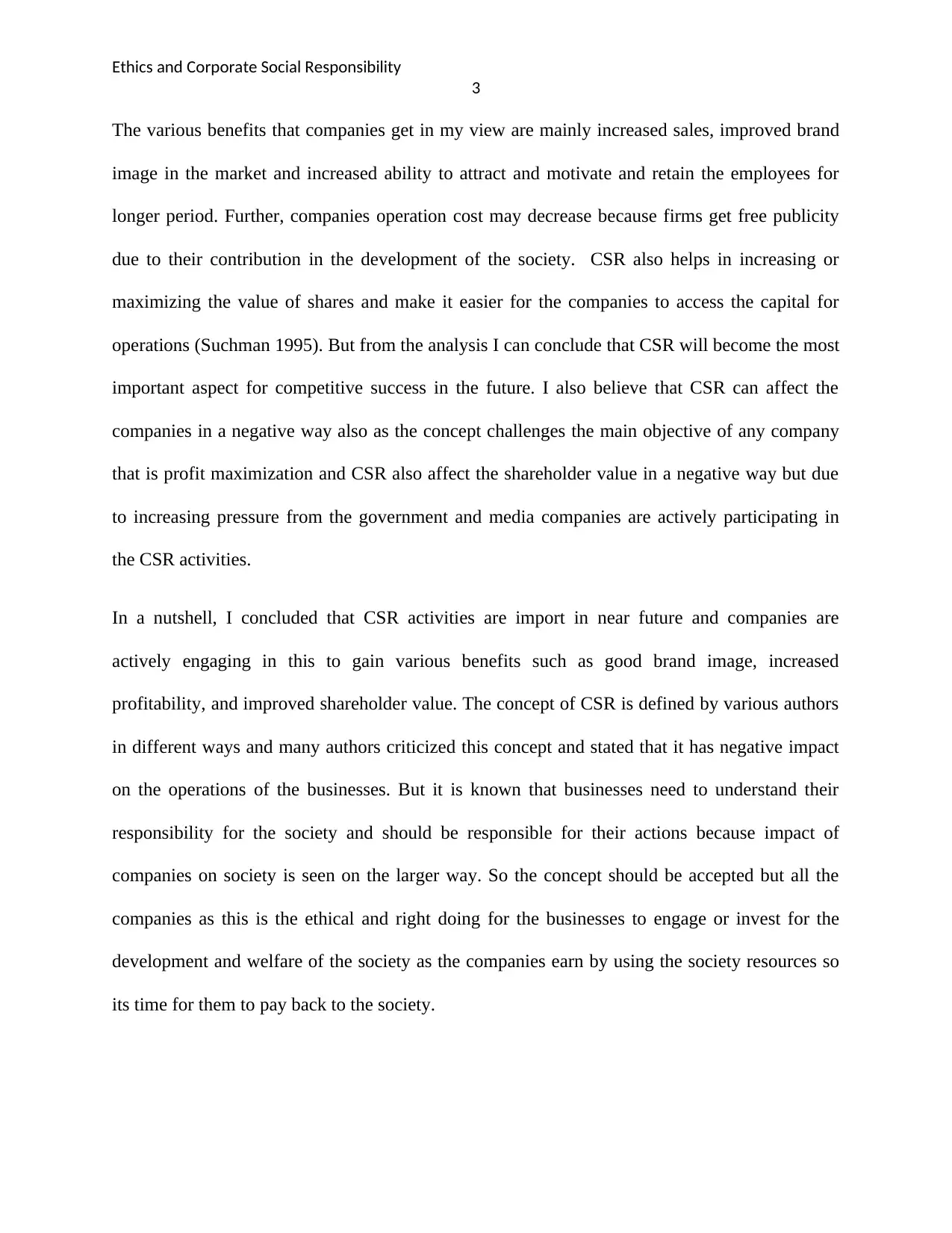
Ethics and Corporate Social Responsibility
3
The various benefits that companies get in my view are mainly increased sales, improved brand
image in the market and increased ability to attract and motivate and retain the employees for
longer period. Further, companies operation cost may decrease because firms get free publicity
due to their contribution in the development of the society. CSR also helps in increasing or
maximizing the value of shares and make it easier for the companies to access the capital for
operations (Suchman 1995). But from the analysis I can conclude that CSR will become the most
important aspect for competitive success in the future. I also believe that CSR can affect the
companies in a negative way also as the concept challenges the main objective of any company
that is profit maximization and CSR also affect the shareholder value in a negative way but due
to increasing pressure from the government and media companies are actively participating in
the CSR activities.
In a nutshell, I concluded that CSR activities are import in near future and companies are
actively engaging in this to gain various benefits such as good brand image, increased
profitability, and improved shareholder value. The concept of CSR is defined by various authors
in different ways and many authors criticized this concept and stated that it has negative impact
on the operations of the businesses. But it is known that businesses need to understand their
responsibility for the society and should be responsible for their actions because impact of
companies on society is seen on the larger way. So the concept should be accepted but all the
companies as this is the ethical and right doing for the businesses to engage or invest for the
development and welfare of the society as the companies earn by using the society resources so
its time for them to pay back to the society.
3
The various benefits that companies get in my view are mainly increased sales, improved brand
image in the market and increased ability to attract and motivate and retain the employees for
longer period. Further, companies operation cost may decrease because firms get free publicity
due to their contribution in the development of the society. CSR also helps in increasing or
maximizing the value of shares and make it easier for the companies to access the capital for
operations (Suchman 1995). But from the analysis I can conclude that CSR will become the most
important aspect for competitive success in the future. I also believe that CSR can affect the
companies in a negative way also as the concept challenges the main objective of any company
that is profit maximization and CSR also affect the shareholder value in a negative way but due
to increasing pressure from the government and media companies are actively participating in
the CSR activities.
In a nutshell, I concluded that CSR activities are import in near future and companies are
actively engaging in this to gain various benefits such as good brand image, increased
profitability, and improved shareholder value. The concept of CSR is defined by various authors
in different ways and many authors criticized this concept and stated that it has negative impact
on the operations of the businesses. But it is known that businesses need to understand their
responsibility for the society and should be responsible for their actions because impact of
companies on society is seen on the larger way. So the concept should be accepted but all the
companies as this is the ethical and right doing for the businesses to engage or invest for the
development and welfare of the society as the companies earn by using the society resources so
its time for them to pay back to the society.
Paraphrase This Document
Need a fresh take? Get an instant paraphrase of this document with our AI Paraphraser
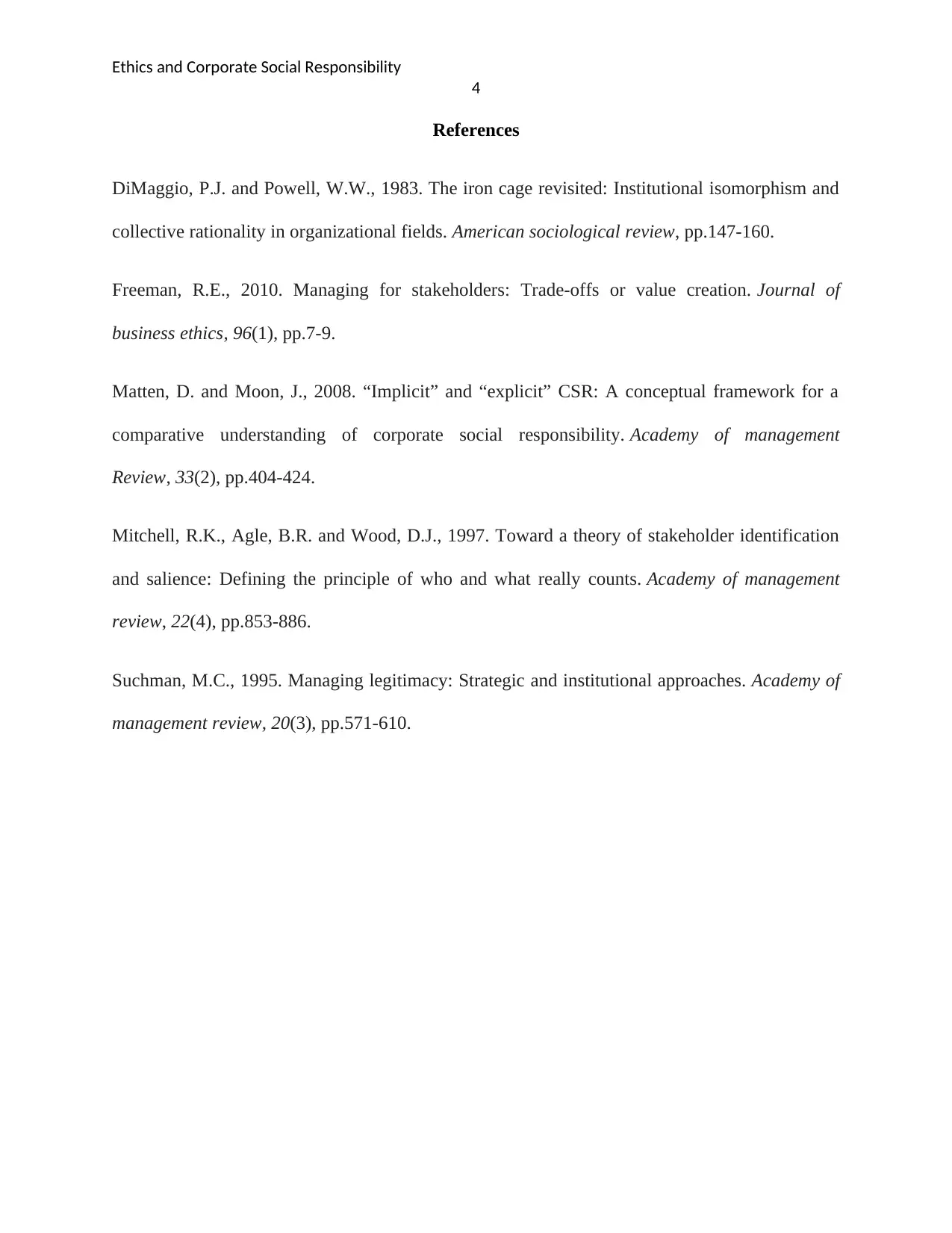
Ethics and Corporate Social Responsibility
4
References
DiMaggio, P.J. and Powell, W.W., 1983. The iron cage revisited: Institutional isomorphism and
collective rationality in organizational fields. American sociological review, pp.147-160.
Freeman, R.E., 2010. Managing for stakeholders: Trade-offs or value creation. Journal of
business ethics, 96(1), pp.7-9.
Matten, D. and Moon, J., 2008. “Implicit” and “explicit” CSR: A conceptual framework for a
comparative understanding of corporate social responsibility. Academy of management
Review, 33(2), pp.404-424.
Mitchell, R.K., Agle, B.R. and Wood, D.J., 1997. Toward a theory of stakeholder identification
and salience: Defining the principle of who and what really counts. Academy of management
review, 22(4), pp.853-886.
Suchman, M.C., 1995. Managing legitimacy: Strategic and institutional approaches. Academy of
management review, 20(3), pp.571-610.
4
References
DiMaggio, P.J. and Powell, W.W., 1983. The iron cage revisited: Institutional isomorphism and
collective rationality in organizational fields. American sociological review, pp.147-160.
Freeman, R.E., 2010. Managing for stakeholders: Trade-offs or value creation. Journal of
business ethics, 96(1), pp.7-9.
Matten, D. and Moon, J., 2008. “Implicit” and “explicit” CSR: A conceptual framework for a
comparative understanding of corporate social responsibility. Academy of management
Review, 33(2), pp.404-424.
Mitchell, R.K., Agle, B.R. and Wood, D.J., 1997. Toward a theory of stakeholder identification
and salience: Defining the principle of who and what really counts. Academy of management
review, 22(4), pp.853-886.
Suchman, M.C., 1995. Managing legitimacy: Strategic and institutional approaches. Academy of
management review, 20(3), pp.571-610.
1 out of 5
Related Documents
Your All-in-One AI-Powered Toolkit for Academic Success.
+13062052269
info@desklib.com
Available 24*7 on WhatsApp / Email
![[object Object]](/_next/static/media/star-bottom.7253800d.svg)
Unlock your academic potential
Copyright © 2020–2026 A2Z Services. All Rights Reserved. Developed and managed by ZUCOL.




